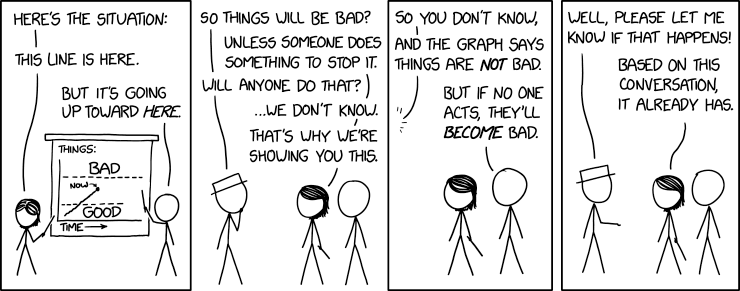It amuses me darkly to see the reaction of the so-called “civilized world” turn from schadenfreude at the plight of the Chinese, to denial and worry, to full-blown panic in the past month, as the Coronavirus spreads unchecked to our own communities now.
However I can’t help but see similarities in these reactions to the ones we have to the climate apocalypse, albeit at something like 3 orders of magnitude faster pace.
Like the climate catastrophe, nations not yet affected have been assuming nothing bad will come out of the Coronavirus and that business as usual should continue. Any steps of preparation were sporadic and isolated, from a few “doomers”, often ridiculed by the smug people who assumed this epidemic would simply fizzle out like the Ebola, or SARS.
They don’t realize, of course, that those diseases might have only fizzled out due to an immediate and good response. But it’s on our nature to label any successful attempt to prevent the worse as an “over-reaction” to something that “wouldn’t have been a big deal”. Frustratingly I see this daily in how many companies perceive investment in their IT departments as an overall loss.
The calls of “climate panic” of climate deniers map very well to the denials and conspiracies created by people when Coronavirus first appeared on the scene. It is for this reason that Europe and US have completely squandered all the time and lesson bought by the Chinese response. And by the time the effects of the pandemic were felt in the western cities, it was way to late to mount an effective response, and the cost of that response is likewise orders of magnitude what it could have been had measures been taken early enough.

Likewise, by the time the real effects of the climate catastrophe start being felt in an undeniable manner, it will be way too late to salvage it. The cost to the existing sociopolitical systems will be prohibitive and thus nothing significant will be effected.
The people in power assume that they will be spared the worst of a catastrophe, but as Coronavirus spreads indiscriminately and the old plutocrats realize their money cannot shield them, so will the collapse of modern civilization from climate catastrophe make their power vanish into thin air as their private security forces realize who has the power in an apocalyptic situation.
The worst thing in my opinion is that we cannot even use this epidemic as an effective wake-up experience because of the timescale of the climate. To mount an solid response to the global warming, we should have started 30 years ago, but like Coronavirus, we simply squandered out rime into business as usual because “it hasn’t happened yet”.
In the scale of climate Catastrophe I speculate we are at the phase Coronavirus was two weeks ago. Some isolated nations have felt the brutal effects, but they were either not significant enough, or those nations themselves could somehow be blamed for it. By the time the climate catastrophe finally manages to panic as many people as Coronavirus has today (5-10 years I expect), it will be too late to do much about it.




